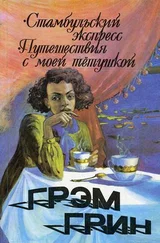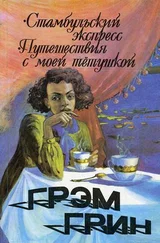Грэм Грин - The Comedians
Здесь есть возможность читать онлайн «Грэм Грин - The Comedians» весь текст электронной книги совершенно бесплатно (целиком полную версию без сокращений). В некоторых случаях можно слушать аудио, скачать через торрент в формате fb2 и присутствует краткое содержание. Год выпуска: 1966, Жанр: Классическая проза, на английском языке. Описание произведения, (предисловие) а так же отзывы посетителей доступны на портале библиотеки ЛибКат.
- Название:The Comedians
- Автор:
- Жанр:
- Год:1966
- ISBN:нет данных
- Рейтинг книги:3 / 5. Голосов: 1
-
Избранное:Добавить в избранное
- Отзывы:
-
Ваша оценка:
- 60
- 1
- 2
- 3
- 4
- 5
The Comedians: краткое содержание, описание и аннотация
Предлагаем к чтению аннотацию, описание, краткое содержание или предисловие (зависит от того, что написал сам автор книги «The Comedians»). Если вы не нашли необходимую информацию о книге — напишите в комментариях, мы постараемся отыскать её.
The Comedians — читать онлайн бесплатно полную книгу (весь текст) целиком
Ниже представлен текст книги, разбитый по страницам. Система сохранения места последней прочитанной страницы, позволяет с удобством читать онлайн бесплатно книгу «The Comedians», без необходимости каждый раз заново искать на чём Вы остановились. Поставьте закладку, и сможете в любой момент перейти на страницу, на которой закончили чтение.
Интервал:
Закладка:
2
I would lose the proper proportions of my subject if I were to recount every stage of my progress from the casino in Monte Carlo to another casino in Port-au-Prince, where I found myself again in possession of money and in love with a woman, a coincidence no more unlikely than the encounter on the Atlantic between three people called Smith, Brown and Jones.
In the long interval I had led a hand-to-mouth existence, except for a period of peace and respectability which came with the war, and not all my occupations were of the kind to find a place in my curriculum vitae. The first job I obtained, thanks to my good knowledge of French (my Latin was singularly unhelpful), was at a small restaurant in Soho where I served for six months as a waiter. I never mentioned that, nor my graduation to the Trocadero, thanks to a forged reference from Fouquet's in Paris. After some years at the Trocadero I rose to being adviser to a small firm of educational publishers who were launching a series of French classics with notes of a scrupulously cleansing nature. That did find a place in my curriculum. Others that followed did not. Indeed I was a little spoilt by the security of my employment during the war, when I served in the Political Intelligence Department of the Foreign Office, supervising the style of our propaganda to Vichy teffitory, and even had a lady novelist as my secretary. When the war was over I wanted something better than my old life of hand-to-mouth, though nevertheless for some years I returned to that way of life, until at last an idea came to me south of Piccadilly, outside one of those galleries where you are likely to see a less than pedigree work by an obscure seventeenth-century Dutch painter, or perhaps it was outside a gallery a degree lower in the trade where a taste for jovial cardinals enjoying their Friday salmon was mysteriously catered for. A middleaged man wearing a double-breasted waistcoat and a watchchain, a man remote, I would have said, from artistic interests, stood gazing at the pictures, and suddenly I thought I knew exactly what was passing in his mind. 'At Sotheby's last month a picture fetched a hundred thousand pounds. A picture can represent a fortune — if one knew enough or even took a chance,' and he stared very hard at some cows in a meadow, as though he were watching a little ivory ball running round a groove. It was surely the cows in the meadow at which he gazed and not the cardinals. No one could possibly envisage the cardinals in a Sotheby sale.
A week after that vision south of Piccadilly I gambled most of what I had accumulated during more than thirty years and invested in a trailer-caravan and about twenty inexpensive prints — there was an Henri Rousseau at one end of the scale and a Jackson Pollock at the other. I hung these on one side of my van with a record of the sums which they had fetched at auction and the date of the sales. Then I procured a young art student able to turn me out rapidly a number of rough pastiches which he signed each time with a different name — I would often sit with him while he worked and try out signatures on a piece of paper. In spite of the example of Pollock and Moore, which proved that even an Anglo-Saxon name could have value, most of the names were foreign. I remember Msloz only, because his work obstinately refused to sell, and in the end we had to paint out his signature and substitute Weill. I had come to realize that the purchaser wanted, as his minimum satistion, to be able to pronounce a name — 'I got a new Weill the other day,' and the nearest that even I could get to Msloz sounded like Sludge, a name which may have caused unconscious purchaser-resistance.
I would drive from one provincial city to another dragging my trailer, and come to rest in a well-to-do suburb of an industrial city. I soon realized that scientists and women were of little use to me: scientists know too much, and few housewives love to gamble without the sight of ready cash that Bingo provides. I needed gamblers, for the point of my exhibition was really this: 'Here on one side of the gallery you can see the pictures which have fetched the highest prices in the last fen years. Would you have guessed that these "Cyclists" by Lйger, this "Station-master " by Rousseau were worth a fortune? Here, on the other, you have a chance to spot their successors and win a fortune too. If you lose, at least you have something on your walls to talk about to your neighbours, you gain the reputation of being an advanced art-patron, and it won't cost you more than — ' My price varied from twenty to fifty pounds according to the neighbourhood and the customer; I even once sold a two-headed woman a long way after Picasso for a hundred.
As my young man became more skilful at his job he would turn me out an assorted half-dozen paintings in a morning and I paid him two pounds ten for each. I was robbing nobody; with fifteen pounds for a morning's work he was well satisfied; I was even helping young promise, and I am sure that many a dinner party in the provinces went better because of some outrageous challenge to good taste upon the walls. I once sold an imitation Pollock to a man who had Walt Disney dwarfs planted in his garden, around the sun-dial and on either side the crazy paving. Did I harm him? He could afford the money. He had an air of complete invulnerability, though God knows for what aberration in his sexual or business life Dopey and the other dwarfs may have compensated.
It was soon after my success with Dopey's owner that I received my mother's appeal — if you could call it an appeal. It came in the shape of a picture-postcard which showed the ruined citadel of the Emperor Christophe at Cap Haпtien. She wrote on the back of it her name, which was new to me, her address and two sentences, 'Feel a bit of a ruin myself. Nice to see you if you come this way.' In brackets after 'Maman' — not recognizing her hand I read it first not unsuitably as 'Manon' — she added 'Comtesse de Lascot-Villiers.' It had taken many months to find me.
I hadn't seen my mother since one occasion in Paris in 1934, and I had not heard from her during the war. I daresay I would not have answered her invitation but for two things — it was the nearest she had ever approached to a maternal appeal, and it was really time for me to finish with the travelling art-gallery, for a Sunday paper was trying to find out the source of my paintings. I had more than a thousand pounds in the bank. I sold the caravan, the stock and the reproductions to a man who never read the People for five hundred pounds, and I flew out to Kingston, where I looked around unsuccessfully for business opportunities before taking another plane to Port-au-Prince.
3
Port-au-Prince was a very different place a few years ago. It was, I suppose, just as corrupt; it was even dirtier; it contained as many beggars, but at least the beggars had some hope, for the tourists were there. Now when a man says to you, 'I am starving,' you believe him. I wondered what my mother was doing at the Hotel Trianon, whether she was existing there on a pension from the count, if there had ever been a count, or whether perhaps she was working as a housekeeper. She had been employed when I saw her last in 1934 as a vendeuse in one of the minor couturiers. It was regarded in that pre-war period as a rather smart thing to employ an Englishwoman, so she had called herself Maggie Brown (perhaps her married name really was Brown).
For the sake of prudence I took my bags to the El Rancho, a luxurious Americanized hotel. I wanted to be comfortable so long as my money lasted, and nobody at the airport could tell me anything about the Trianon. As I drove up between the palm trees it looked bedraggled enough: the bougainvillaea needed cutting back and there was more grass than gravel on the drive. A few people were drinking on the balcony, among them Petit Pierre, though I was to learn soon enough that he paid for his drinks only with his pen. A young well-dressed negro met me on the steps and asked me whether I needed a room. I said I had come to see 'Madame la Comtesse' — I couldn't keep the double-barrelled name in mind and I had left the postcard in my hotel room.
Читать дальшеИнтервал:
Закладка:
Похожие книги на «The Comedians»
Представляем Вашему вниманию похожие книги на «The Comedians» списком для выбора. Мы отобрали схожую по названию и смыслу литературу в надежде предоставить читателям больше вариантов отыскать новые, интересные, ещё непрочитанные произведения.
Обсуждение, отзывы о книге «The Comedians» и просто собственные мнения читателей. Оставьте ваши комментарии, напишите, что Вы думаете о произведении, его смысле или главных героях. Укажите что конкретно понравилось, а что нет, и почему Вы так считаете.



